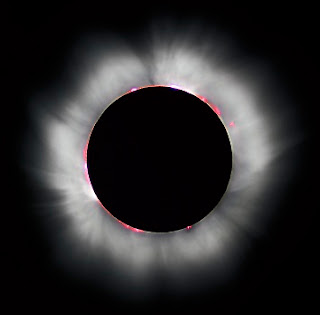Have you ever seen a solar eclipse? Did you notice
the ring of light spreading out from the dark circle where the Moon covers the
Sun? That's called the corona (from the Latin word for crown, after its shape)
and it's a kind of plasma atmosphere extending millions of miles into space from
the Sun's surface. One of the questions I've been looking at this week is why
this corona is about a thousand times hotter than the solar surface below it.
Heat doesn't naturally flow from cooler regions to hotter ones (try cooking your
dinner in the fridge!) so how does the Sun keep its atmosphere so hot?
Image from: Luc Viatour / www.Lucnix.be
This is just one of the questions I've been
looking at over the past few days, others have included how we evolved to
produce milk for our children, and why ancient stars spin more slowly than
expected.
With just this week and next to go in my internship I have been focussing on writing up all the information I have been able to glean from my interactions with various researchers. In addition to writing up a number of individual “things”, I have also been putting together a larger piece on why everything in our galaxy and those around it (and perhaps in the whole observable universe) consists of matter rather than anti-matter.
Working on these larger pieces with the editorial team has helped me to develop a much better perspective on the aim of the website both in terms of style and content. These interactions have shaped the way I view my role within the team. There is always a difficult line to be drawn between scientific accuracy and avoiding jargon or overly technical language. Given that the site uses editors to compile the final articles, I now tend to be happier being more comprehensive and specific than is always necessary, trusting that extraneous language can be removed later.
With just one week left to go, I still hope to get a significant number of new things written up, although I cannot see myself simply stopping at the end of my internship. For sites like this to work, they require submissions from volunteers, and I feel strongly enough that TWDK is a good and necessary project, that my intention is to continue submitting pieces whenever I come across an interesting new unsolved question in science.
If you want to get involved in Things We Don't Know get in touch via email.


No comments:
Post a Comment